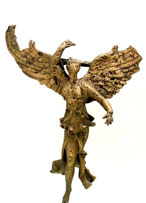| Author | |
|---|---|
| Epoch | XII c. |
| Work | Life and work and desert of Saint Nino, the merited mother of ours, who preached Christ, our God, in the Northern country and educated Georgian nation (Ancient Georgian Hagiographic Literary Works, book III (Meta-phrasal Editorships), under the guida |
| Type | |
| Quote | “When Alexander Macedonian became a king, first he drove wicked foreign tribes away to the West and exterminated them in the Northern country and when he returned and entered Kartli he became stronger and conquered the whole world; that’s what Alexander Macedonian did by his wisdom and prowess” (pg. 46) |
| Term |

| Comment | G. Kavtaradze: “It is well known, that Alexander himself never invaded Caucasus, although the Georgian and Armenian chronicles’ notes, justly considered legendary, about Alexander the Great’s involvement in the matters of Caucasus and its adjacent territories and, in all probability, the local governors’ really existing wishes to link their own goals to Macedonians’ interests and use their power for the realization of these goals, are allegedly reflected in the Roman writer’s and politician’s of the II century A.D., Flavius Arianne’s work “Alexander’s Campaign” [According to Flavius Arianne’s note, in 329/328 B.C. Pharsmanes, the king of “Khwarezm”, visited Alexander and offered him alliance in fighting against Colchis and Amazons. Alexander promised him that after conquering Asia and returning via Hellespont and Proponditis he would by all means invade Ponto (Arrianus, 67, XV, IV)E.K.] (G. Kavtaradze, Probleme der historischen Geographie Anatoliens und Transkaukasiens im ersten Jahrtausend v. Chr. (Caucasica) – Orbis Terrarum, Internationale Zeitschrift für historische Geographie der Alten Welt, 2, 1996, Stuttgart, 1996, 191-216). P. Ingorokhva: “Monk Arsen made use of the Georgian historian’s (Georgian Jew by origin) of the 4th century A.D., Abiatar’s lost work “Life and Conversion of Kartli and the Story on Relationship, and Who of us is of what Provenance, i.e. how we were Converted and Accepted Christianity” (P. Ingorokhva, Ancient Georgian Chronicle “Conversion of Kartli” and the list of the kings of antique Iberia, Georgian State Museum’s Chronicle. vol. XI, B, 1941). |
|---|

